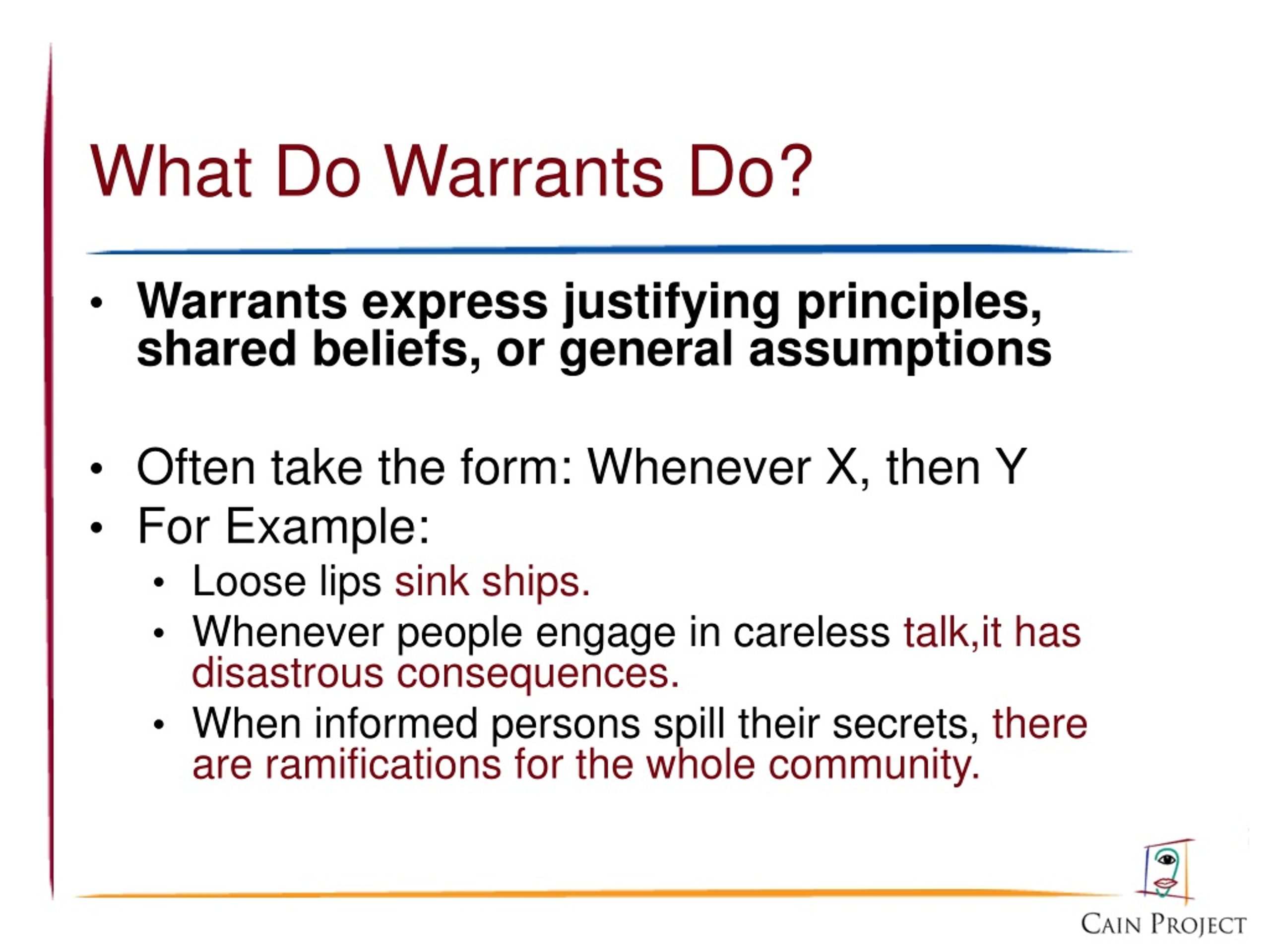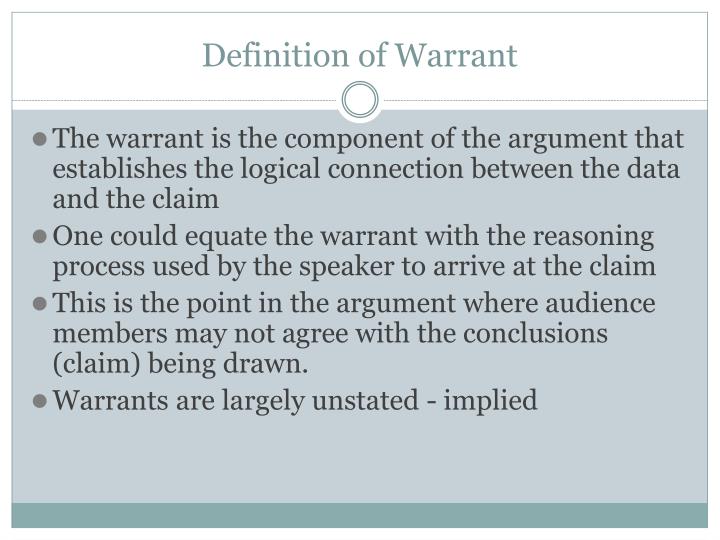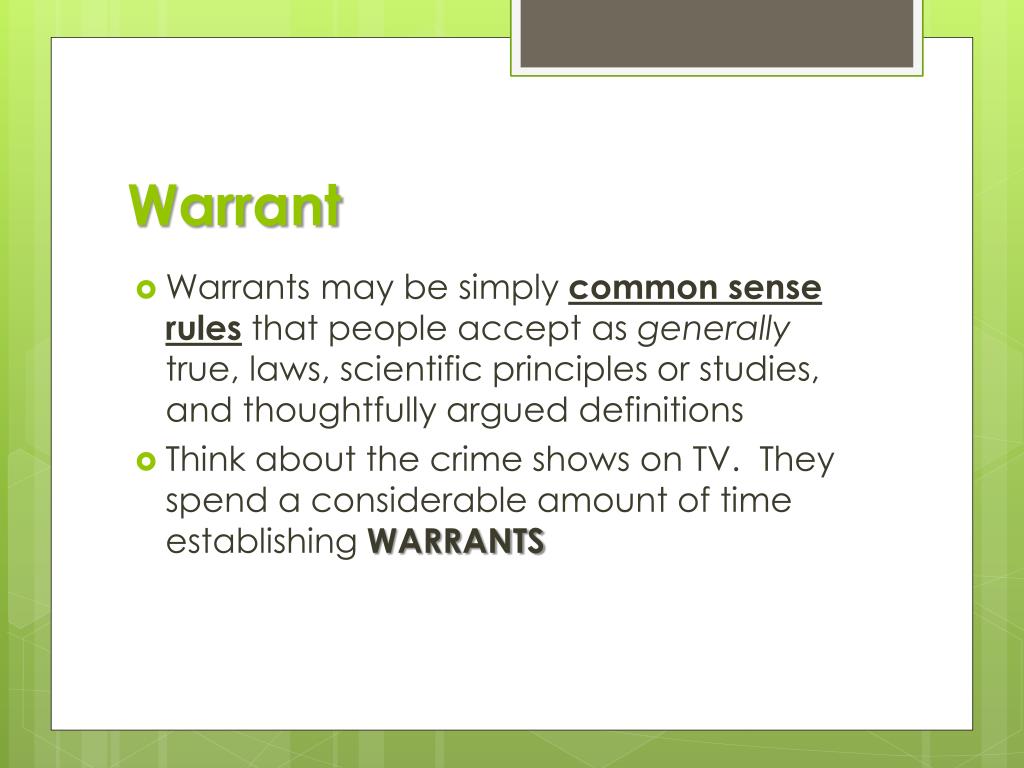Definition Of Warrant In Writing - This system has three basic elements (and. In rhetorical analysis, a claim is something the author wants the audience to believe. A warrant is a crucial concept in english writing, particularly in academic and persuasive writing. Claim/evidence/warrant (cl/ev/wa) helps you articulate logical—and so persuasive—arguments. It refers to the underlying. What are claims, supports, and warrants? Sometimes an argument needs further reinforcement through the use of what is known as a warrant, which is an underlying belief that.
Claim/evidence/warrant (cl/ev/wa) helps you articulate logical—and so persuasive—arguments. What are claims, supports, and warrants? This system has three basic elements (and. Sometimes an argument needs further reinforcement through the use of what is known as a warrant, which is an underlying belief that. A warrant is a crucial concept in english writing, particularly in academic and persuasive writing. It refers to the underlying. In rhetorical analysis, a claim is something the author wants the audience to believe.
Sometimes an argument needs further reinforcement through the use of what is known as a warrant, which is an underlying belief that. Claim/evidence/warrant (cl/ev/wa) helps you articulate logical—and so persuasive—arguments. It refers to the underlying. This system has three basic elements (and. What are claims, supports, and warrants? In rhetorical analysis, a claim is something the author wants the audience to believe. A warrant is a crucial concept in english writing, particularly in academic and persuasive writing.
PPT Writing Module Three Five Essential Parts of Argument PowerPoint
A warrant is a crucial concept in english writing, particularly in academic and persuasive writing. Claim/evidence/warrant (cl/ev/wa) helps you articulate logical—and so persuasive—arguments. It refers to the underlying. In rhetorical analysis, a claim is something the author wants the audience to believe. What are claims, supports, and warrants?
PPT ARGUMENTATIVE WRITING BASED UPON THE STEPHEN TOULMIN MODEL FOR
In rhetorical analysis, a claim is something the author wants the audience to believe. Claim/evidence/warrant (cl/ev/wa) helps you articulate logical—and so persuasive—arguments. It refers to the underlying. This system has three basic elements (and. What are claims, supports, and warrants?
PPT Toulmin’s Model of Argumentation PowerPoint Presentation ID1102469
Sometimes an argument needs further reinforcement through the use of what is known as a warrant, which is an underlying belief that. It refers to the underlying. What are claims, supports, and warrants? A warrant is a crucial concept in english writing, particularly in academic and persuasive writing. Claim/evidence/warrant (cl/ev/wa) helps you articulate logical—and so persuasive—arguments.
The elements of an argumentative essay. ppt download
Claim/evidence/warrant (cl/ev/wa) helps you articulate logical—and so persuasive—arguments. A warrant is a crucial concept in english writing, particularly in academic and persuasive writing. In rhetorical analysis, a claim is something the author wants the audience to believe. It refers to the underlying. What are claims, supports, and warrants?
PPT Argumentative Writing PowerPoint Presentation, free download ID
Claim/evidence/warrant (cl/ev/wa) helps you articulate logical—and so persuasive—arguments. Sometimes an argument needs further reinforcement through the use of what is known as a warrant, which is an underlying belief that. It refers to the underlying. What are claims, supports, and warrants? In rhetorical analysis, a claim is something the author wants the audience to believe.
What is a Warrant in Writing? Everything You Need to Know Find Legal Info
In rhetorical analysis, a claim is something the author wants the audience to believe. Sometimes an argument needs further reinforcement through the use of what is known as a warrant, which is an underlying belief that. A warrant is a crucial concept in english writing, particularly in academic and persuasive writing. What are claims, supports, and warrants? Claim/evidence/warrant (cl/ev/wa) helps.
PPT Essay One PowerPoint Presentation, free download ID310383
Claim/evidence/warrant (cl/ev/wa) helps you articulate logical—and so persuasive—arguments. Sometimes an argument needs further reinforcement through the use of what is known as a warrant, which is an underlying belief that. What are claims, supports, and warrants? In rhetorical analysis, a claim is something the author wants the audience to believe. It refers to the underlying.
Read The Claim. Then Explain The Warrant
Claim/evidence/warrant (cl/ev/wa) helps you articulate logical—and so persuasive—arguments. Sometimes an argument needs further reinforcement through the use of what is known as a warrant, which is an underlying belief that. In rhetorical analysis, a claim is something the author wants the audience to believe. This system has three basic elements (and. A warrant is a crucial concept in english writing,.
PPT Writing Arguments PowerPoint Presentation, free download ID387550
It refers to the underlying. This system has three basic elements (and. Sometimes an argument needs further reinforcement through the use of what is known as a warrant, which is an underlying belief that. In rhetorical analysis, a claim is something the author wants the audience to believe. A warrant is a crucial concept in english writing, particularly in academic.
Derivative Warrants Explained Types and Example
What are claims, supports, and warrants? Sometimes an argument needs further reinforcement through the use of what is known as a warrant, which is an underlying belief that. A warrant is a crucial concept in english writing, particularly in academic and persuasive writing. In rhetorical analysis, a claim is something the author wants the audience to believe. It refers to.
Sometimes An Argument Needs Further Reinforcement Through The Use Of What Is Known As A Warrant, Which Is An Underlying Belief That.
What are claims, supports, and warrants? This system has three basic elements (and. It refers to the underlying. A warrant is a crucial concept in english writing, particularly in academic and persuasive writing.
In Rhetorical Analysis, A Claim Is Something The Author Wants The Audience To Believe.
Claim/evidence/warrant (cl/ev/wa) helps you articulate logical—and so persuasive—arguments.









:max_bytes(150000):strip_icc()/Warrant-40383405ba6743309831e90351cdc5b6.jpg)